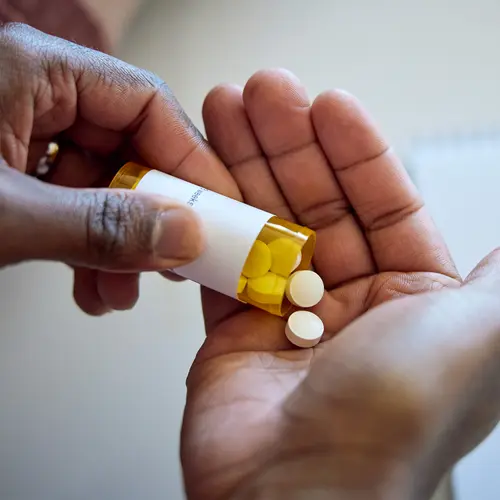Schizophrenia is a complex condition that still carries a lot of confusion and stigma. If you or someone close to you has it, you'll want to learn more about treatments that can control symptoms.
Crystal C. Watkins, MD, PhD, assistant professor at the Johns Hopkins School of Medicine, shares information on the most effective treatments and tips on how to stay on track with therapy so you or your loved one can start getting well.
How do antipsychotic medicines help with symptoms?
The medication helps to lessen symptoms like paranoid thoughts and voices. For some people, medications can get rid of these symptoms.
Do people need to stay on schizophrenia medicines long-term?
In order to keep the symptoms at bay, you need to take the medication long-term.
Often, people take the medication, notice their symptoms are better, and then decide, "Well, I'm feeling much better, so I can stop taking the medication." And when they stop taking the medication, their symptoms come back or get worse, and then they're not able to maintain their daily functioning.
What are the pros and cons of long-acting medications that are given as shots?
The benefit is that you have constant medication, which helps the symptoms. The downside is, if you have a bad reaction to the shot, then it's difficult to counteract it right away.
The main side effect is extreme muscle stiffness -- the same as you'd have with the oral medications. But you can have it right away. So we usually start with a very low dose of the shots to prevent that.
The main problem is people often think that once they have the shot, they don't have to take the pills. It really depends on the medication. We leave people on the pills for a couple of months while they take the shots.
Now, there are second-generation shots. With these, you don't have to take the pills as long while you're taking the shots.
What are the main side effects of antipsychotic medicines?
One of the most common side effects of schizophrenia medications is related to the muscles or movement. Some people feel stiff. They may also have jerky movements. Some people gain weight, feel sleepy, or get a little bit dizzy.
The older medications cause more muscle stiffness, muscle twitches, and movement effects. The newer medications don't affect the muscles as much.
What can be done to manage medicine side effects?
We often start with the newer antipsychotic drugs because people are able to tolerate them a little bit better. They're less likely to give up on the medication and will give them a chance to work.
With the older medications, we can start them off at a low dose and then increase them slowly, which can stop or lessen a lot of the side effects.
How can therapy help with schizophrenia?
Part of what plagues people with schizophrenia is deciding what is reality and what is not, and then how to manage these symptoms. More and more, we're finding that therapy is very helpful for distinguishing reality from the symptoms of the condition.
What types of therapy are most helpful?
Cognitive behavioral therapy helps patients understand some of the changes that are going on in their brain and why they are having these experiences. It allows people to recognize their symptoms and encourages them to seek help, and to talk to others when they're having these experiences.
Part of therapy is getting the family involved. We find that people with schizophrenia who have family support do really well. They have a network of people who make sure they take their medications and who keep tabs on them.
The other part of therapy is keeping people active. If they can complete their education, if they're able to have some kind of outside activities and work with other people who have similar symptoms (like going to support groups), they tend to do better long-term, and they're less likely to be hospitalized.
What can be done if someone doesn't get better from medicine or therapy?
About one-third of people with schizophrenia may not respond to their medications. Then we use combinations of medications. Instead of just antipsychotic medications, other drugs may be added.
When they have severe depression, antidepressants may be added. If they have issues with behavior, mood stabilizers or other combination therapies are added. And a small area of research shows that electroshock therapy sometimes helps people who have severe depression and psychosis.
What can people with schizophrenia do to better manage their symptoms?
Getting them involved in a vocational program or day program is very therapeutic and helpful along with the medication. Getting up each day, getting yourself bathed and dressed, having something to do -- organization and structure are very effective.
How can caregivers help with treatment?
Sometimes, people with schizophrenia won't take the medication because they might be suspicious, thinking that it's poisoned or that someone is trying to change their medication. A family member can partner with the doctor, therapist, or social worker to help them know exactly which medications they are taking.
The other thing family members can do is encourage the person to stay active and involved, either with peer groups -- hospital groups or day treatment groups -- or by involving them with organizations that will reach out and give them a place to work or things to do during the day.

